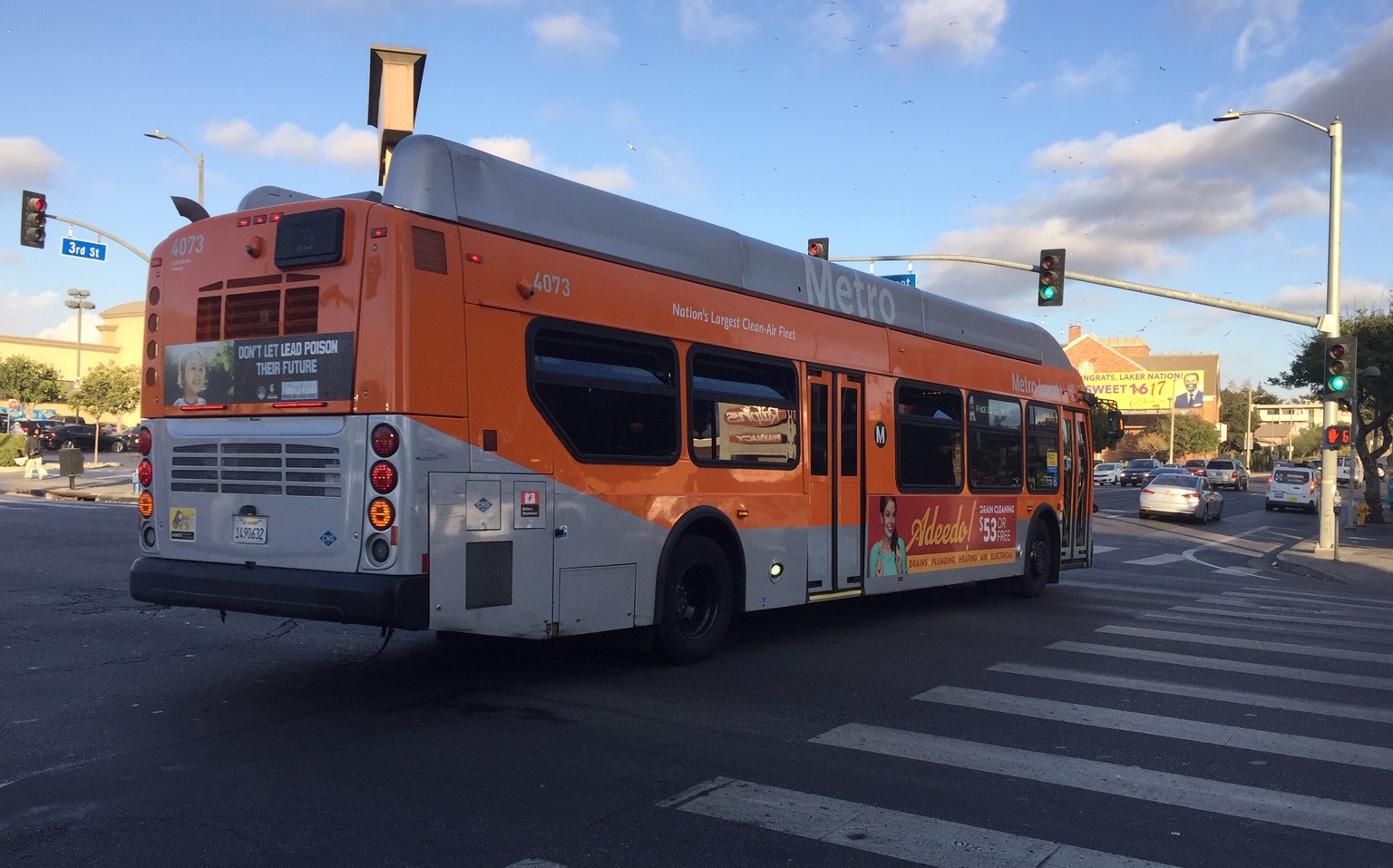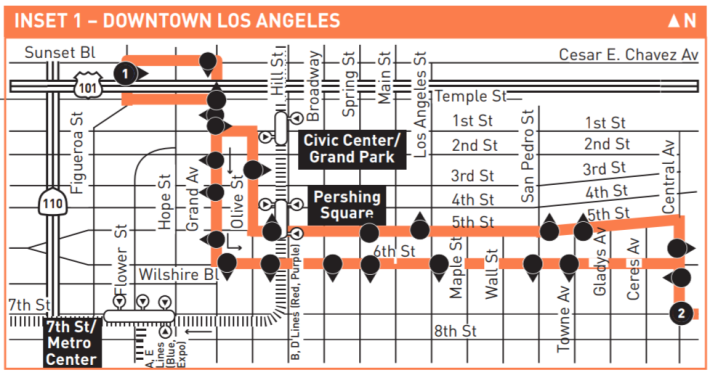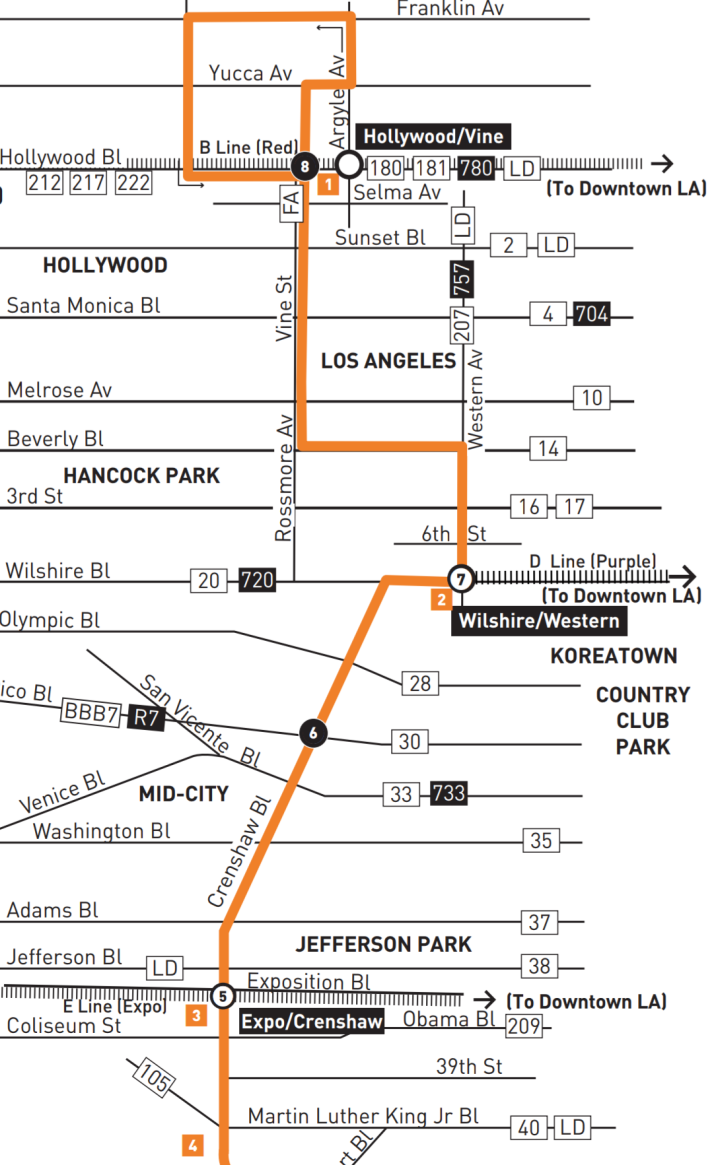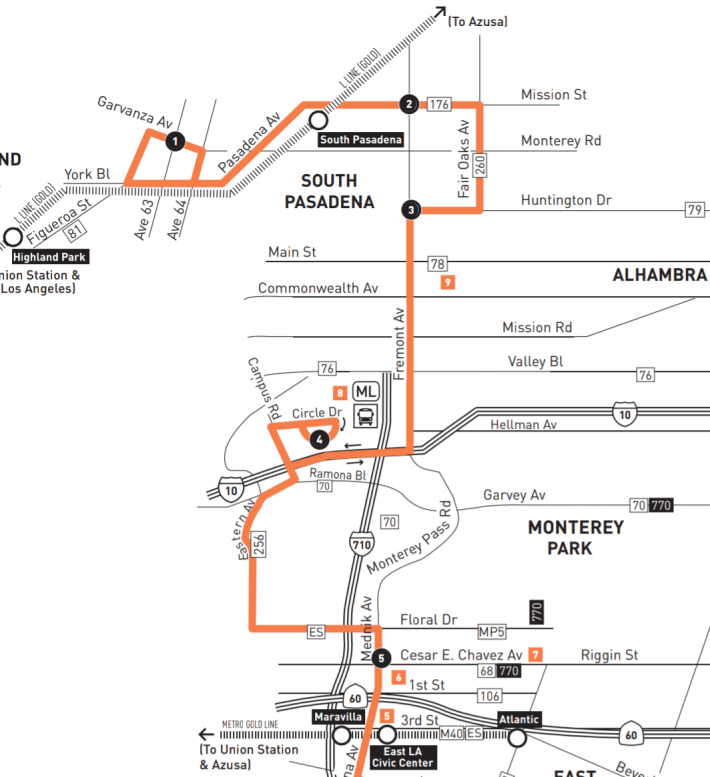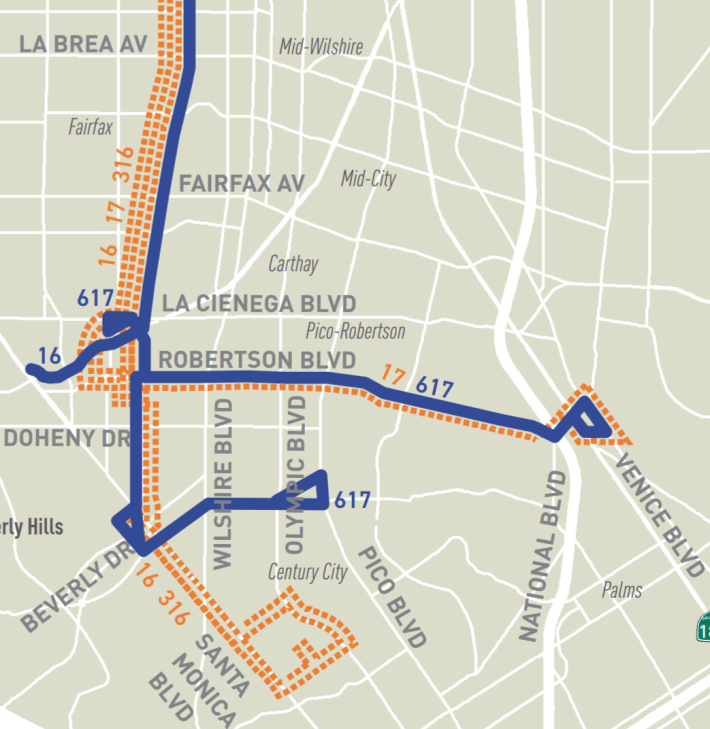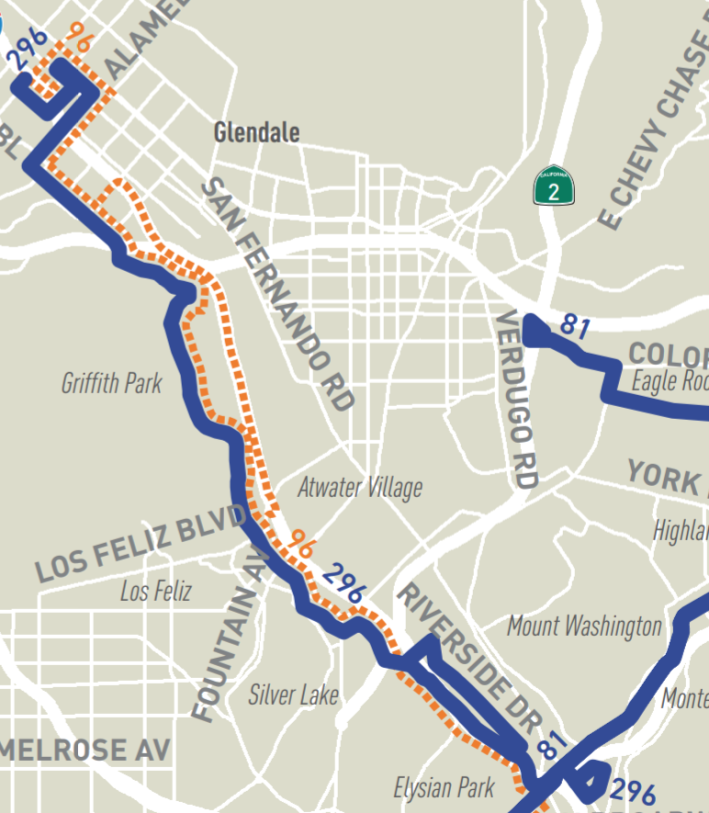Last Sunday, Metro implemented service changes. This set of adjustments is especially significant, as it starts the roll out of the long-planned NextGen bus service restructuring.
As I explained in my earlier post, NextGen implementation will be
during three consecutive service adjustments (December 2020, June 2021, and December 2021). The service adjustment, or “shake-up,” is Metro’s semi-annual process by which operators bid on driving slots awarded based on seniority per the SMART (the International Association of Sheet Metal, Air, Rail and Transportation Workers) union collective bargaining agreement with the agency; service changes are generally implemented as part of the shake-up.
The current service adjustment is deliberately less ambitious than the next two rounds will be in order to ease the system into the process, according to Metro staff. But it is also reflective of the short interval between October board approval of the planned service changes and now. [Find the detailed board report on the changes here; find the staff presentation on them here.]
Adjustments that took effect last Sunday break down as follows:
- Eight of the lowest performing rapids are discontinued (705, 710, 728, 740, 745, 751, 760, 762) while the locals they overlap (28, 40, 45, 69, 105, 210, 251, 260) have increased service frequency and, to improve speed, eliminated select stops.
- Some changes that took place in April (as part of the pandemic service reductions) have been made permanent - including eliminating ten limited lines (302, 312, 316, 330, 351, 353, 355, 358, 364, 378) plus express route 442 and 217 service south of the Expo line. But one April suspension is ending with the return of the 106 (weekdays).
- Some stops at rail lines have been eliminated (55, 60, 62, 76).
- Some unproductive segments have been eliminated (487, 489, 534).
- Two routes/schedules were tweaked to better serve key destinations (117, 161).
- Five lines were discontinued (126, 254*, 607, 612* and 625*) plus owl overnight service was ended on the 601 and service south of Willowbrook/Rosa Parks Station on the 55. Replacement service options for lines with an asterisk include the new Metro Micro on-demand shared ride service that started Sunday.
Four significant route changes were implemented, as seen below.
In downtown L.A., routes 20 and 60 have shifted to the new bus lanes on 5th and 6th Streets.
The new Line 60 routing:
A timetable map of the new Line 20 routing:
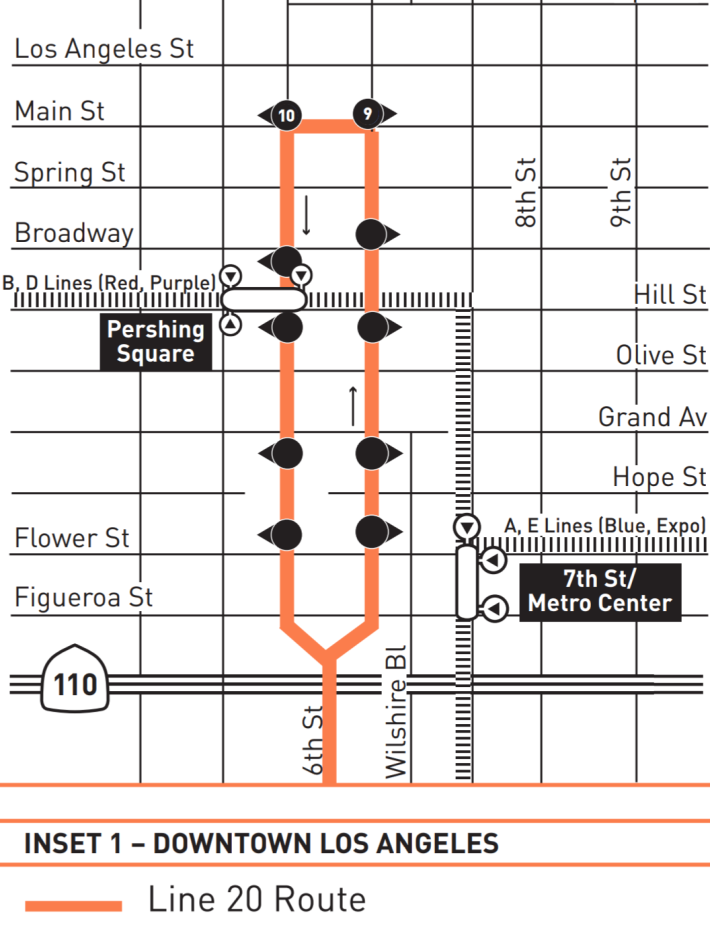
The timetable map of Line 20 east of downtown gives no hint where the line shifts to 6th St. (it is shown as on Wilshire east of Witmer, likely jogging to 6th via Valencia). It also incorrectly shows the 487 and 489 still operating on Wilshire, despite them being eliminated last Sunday:
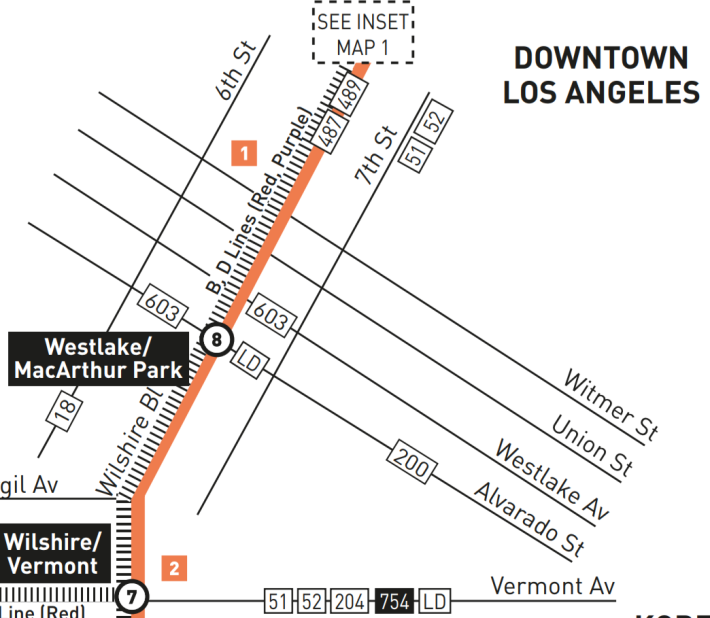
Route 210 (below) now serves the Wilshire/Western station. Its new routing will likely please the Hancock Park NIMBYs who have long lobbied against any bus service on Rossmore. In 2007, at a meeting in Carson - seventeen miles from Hancock Park - three of the neighborhood's residents successfully lobbied for the Rapid 710 to no longer serve Hollywood via Rossmore/Vine (see page 7). Not captured in the minutes were the derisive comments allegedly made about bus riders being unhygienic and undesirable.
Route 258 (below) now serves the South Pasadena L Line (Gold) station; the eliminated segment on Huntington Dr. will still be served by the 79, and the segment on Lake will be served by the 180 (north of Colorado) and Pasadena Transit Route 20 (north of California).
_______
How the current version of NextGen was approved
At the January 23, 2020, Metro Board meeting the Board voted to release the NextGen proposal for public comment. Plans for the series of NextGen public workshops first launched in February, however, were quickly upended by the pandemic.
SO.CA.TA (Southern California Transit Advocates) questioned the very advisability of NextGen even going forward in such an environment of uncertainty, saying that, until "we can see what the long range effects are...the general entire system revamp should wait until we see what long range conditions are." [See their full comments here.] Kymberleigh Richards, formerly of the Metro San Fernando Valley Service Council, concurred, arguing that "no transit agency, anywhere in the world, is making anything other than temporary service adjustments. None of them, other than Metro, has the audacity to launch a system-wide restructuring right now...rather than shelving it until things approach whatever the 'new normal' is going to be."
Metro forged ahead, primarily via virtual outreach. The NextGen proposal was revised and in August each of the five Service Councils held public hearings in their areas along with an all-region hearing held at Metro’s headquarters building adjacent to Union Station, seeking public comment. Metro reports, ”There were 589 total attendees and 292 comments received” at the hearings. At this time the SO.CA.TA subcommittee submitted its detailed comments on the revised proposal.
A Metro Board report outlined the next steps:
In response to these [public] comments, additional minor adjustments were made to the plan prior to presenting the final recommended service changes to the Service Councils for approval in September 2020. The Service Councils deliberated for a total of 15 hours during their September 2020 meetings. All proposed changes to bus services were adopted with a small number of proposals being improved.
At its October 22, 2020 meeting, the Metro Board approved the NextGen Bus Plan (agenda item 22) on a vote of nine to one. Listening to the Board discussion and public comments (beginning at 56:29) one is struck the officials are mostly effusive while stakeholders and members of the public were more cautious and expressing concerns. A coalition of stakeholder groups submitted a letter expressing disappointment at NextGen implementation falling far short of what was originally promised.
In her comment, Alliance for Community Transit-Los Angeles Campaign & Organizing Manager Scarlett De Leon spoke to these concerns. I reached out to her and she shared an expanded version of her remarks:
We continue to hear from transit riders about long bus wait times and crowded buses during this pandemic this is why we are concerned about a NextGen rollout that is not fully funded. This will mean transit riders will see bus stops disappear and the rerouting of buses lines without the service hours promised. Metro must prioritize transit riders safety by reinstating bus service hours and fully funding NextGen.
In a similar vein TransitCenter in its blog post Los Angeles Bus Riders Speak Out Against Metro’s Bus Service Cuts profiled riders suffering due to the service cuts undertaken in response to the pandemic.
(The no vote in October was L.A. County Supervisor Janice Hahn. Her objection was to one NextGen aspect impacting San Pedro. Metro staff planned to terminate the Silver Line at the Harbor Gateway Transit Center instead of continuing to San Pedro, because of “operational constraints due to the lack of Metro-owned land for charging stations and battery range limitations.” Hahn expressed disbelief that land for a charging station could not be secured and felt compelled to vote no. After some negotiating a revised plan was proposed, approved at the December Board meeting, and lauded by Hahn in a press release.)
_______
How my NextGen critiques have been bourn out
Back in March, I offered comments on a few NextGen proposals involving routes where I have personal experience, none of which are among the changes in Sunday’s shake-up. For those keeping score here is what the Board approved in October and my reactions:
- The unwise combining of routes 2/200 and 217/180, which I opposed, is going forward. One faint hope that the former may not be an utter disaster for schedule adherence is the just announced plans for bus lanes on Alvarado between Sunset and 6th Street. Otherwise oy vey!
- Cancellation of segments of routes 14, 16/316 and 30/330 in Beverly Hills as being unproductive was proposed initially which I supported. Letters dated March 16, 2020 and September 22, 2020 from the city of Beverly Hills expressed concerns (my thanks to Christian Vasquez, Transportation Planning Analyst of the Community Development Department, city of Beverly Hills for making available copies of the letters which I posted online). The most fiery comments regarding NextGen at the October meeting were by Steve Mayer, a self-described daily transit user, who denounced the plans to truncate lines 14 and 16 at La Cienega Blvd and stated his commute as a consequence would be 20-30 minutes longer to and from work. In reaction to the comments of the city and Mr. Mayer (and perhaps others), Metro in the amended NextGen plan included a new route composed of portions of the eliminated 14 and 16 segments. Mayer denounced the resulting route 617 as being an absolute joke and useless.
- Having route 51 end in downtown and no longer serve 7th Street west of downtown Los Angeles drew my rebuke as creating passenger inconvenience. Metro is still going to do it but has arranged to have Downtown Dash route E be extended west to Alvarado as an option in the corridor for those needing to travel to City West or Westlake. Nice try but the E already has healthy ridership and likely no spare seats for the 51 patrons dumped off in downtown. Also one of the alternatives the proposal offered was parallel services on Wilshire (20) and 8th St. (66). Except now the 20 is being re-routed into downtown Los Angeles via 6th St. and therefore not useful for someone traveling in the 7th Street corridor. Plus the 66 like the Dash E is a busy bus with few spare seats. Maybe all these difficulties will convince staff to reconsider?
- Switching Eagle Rock owl service from the 83 to the 81 got my thumbs up as long overdue and has been approved by the Board
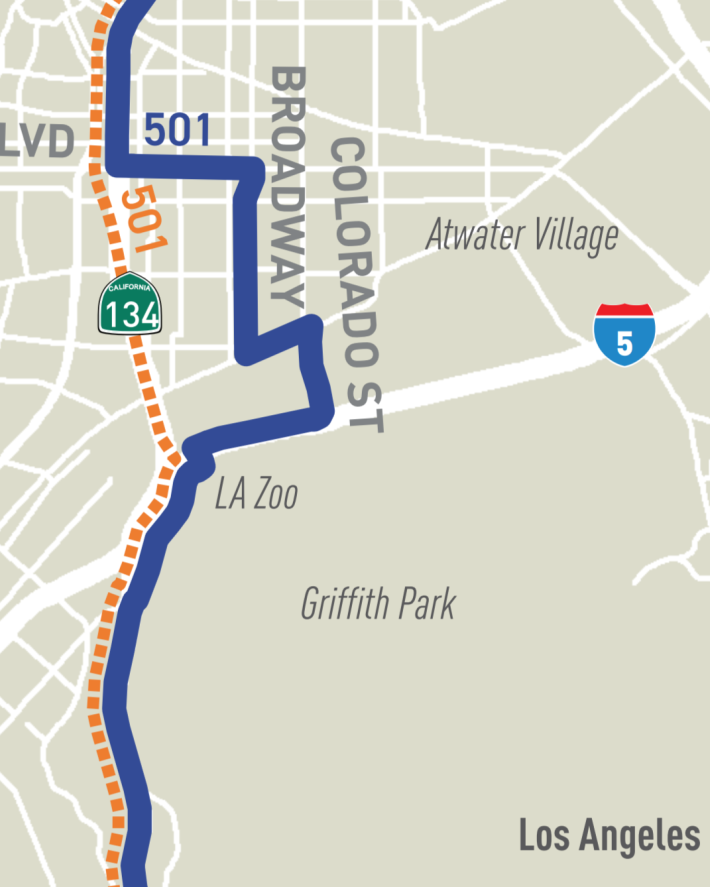
- I also was supportive of cancelling route 96 but not having the 501 add a deviation to serve the Los Angeles Zoo. Instead a new route 296 will take over the northern part of the 96 between Burbank and the L Line (Gold) Lincoln/Cypress Park Station with the southern portion cancelled. The 501 deviation is still going forward but only on weekends.
- Having the portion of the 210 along Rossmore and Vine north of Wilshire converted to a separate route 610 I declared an ill-advised idea. They are doing it. Will the 610 end at Wilshire/Western to facilitate transfers from/to the 210 after the surprise route change of the 210 on Sunday to serve Wilshire/Western? We will see what happens when the split takes place June or December of 2021.
- As I predicted the proposal to cancel 460 service north of Norwalk was withdrawn.
- I expressed grave doubts about Metro's intention to operate Rapids 720 (Wilshire) and 757 (Vermont) only peak hours weekdays, but that is what they plan to do. We will see if the chaos, consternation and confusion I predict occurs.
In April, in response to the pandemic, one of the lines discontinued was route 788. Much like 442 this is seemingly now permanent - although the service change Sunday did not make the fate of the 788 explicit. NextGen is having a revival of Rapid 761 (Sepulveda), which operated from 2003 to 2014, replace the 788. I reached out to Kymberleigh Richards for comments on the situation:
Obviously, as the architect of this line when I was sitting on the Metro San Fernando Valley Service Council I am not only disappointed that staff suspended its operation six months ago but that they now have succeeded in having it cancelled. It has always performed as expected, with nearly full sitting loads on the vast majority of trips. It halved the travel time between the Van Nuys Blvd. Orange Line station and Westwood/Wilshire Blvds. compared to the line 761 service on Sepulveda Blvd. that it was designed as an alternative to. Those who used the line were saving about a half hour per trip; that is an hour per day, five hours every week, and over 250 hours over the course of a full year. That was time spent with their families or other pursuits that had previously been wasted sitting on slower service operating on Sepulveda. Metro just told those people to accept a reduction in their quality of life.
More importantly in my view is that when we approved the 788 in 2014, we promised that it would stay in place until replaced by rail through the Sepulveda Pass. As I do not see any tracks running between the Valley and the Westside, I would have to conclude that Metro does not care about breaking promises made.
Finally, staff appears to have lost the ability to even plan a service change program properly. Cancelling the 788 without implementing the restoration of the 761 (which was touted in the NextGen proposal as its replacement) makes the insult to the passengers more injurious.
If I had any clout left, I'd be calling for the rescission of the Board decision and the suspension of the restructuring until the time is right for both to be properly justified.
_______
What's next for NextGen
What is the path forward for Metro? I see it as three pronged.
The first component is the FY21 Operations Recovery Plan, which is intended to:
- Align bus lines with their respective NextGen service tier standards
- Do not exceed maximum load factors on buses and trains based on industry accepted health and safety standards
- Set criteria for adding service in anticipation of future on-street conditions related to economic sector and/or school re-openings and the return of traffic congestion and effect on bus speeds
- Take full advantage of operational savings from faster bus speeds to achieve performance-based service outcomes
- Restore revenue service hours as appropriate to achieve all of the above outcomes
A first reaction to the first Operations Recovery Plan status report was a blog post by Investing in Place which stated a concern that, “Metro is looking for reasons to maintain broad service cuts to buses as the ‘new normal.’” One hopes Metro is dedicated to not becoming mired in substandard service and a botched NextGen.
The second prong is implementation of the 2020 Customer Experience Plan .
The third is funding the capital portion of the NextGen Transit First scenario - per boardmember Mike Bonin's amendment passed last January. Remember that? It appears to have fallen between the cracks in the midst of the pandemic upheaval but should be undertaken ASAP as essential to ensure the promise of NextGen is fulfilled.
One hopeful sign for Metro's effort to fund the Transit First scenario is serious is the recent success it had in securing from the California Transportation Commission $25 million for NextGen Bus Improvements such as all-door boarding, transit signal priority and bus priority lanes. A small first step but at least it is in the right direction.
As I shelter at home my thoughts are with the bus riders experiencing and coping with the changes. Please use the comments below to report how you are faring navigating the changes. Fingers crossed!
